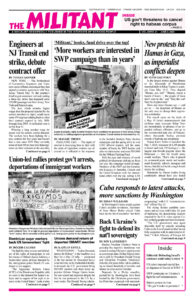Top officials in the Donald Trump administration say they’re leaning toward suspending the constitutionally protected right of habeas corpus, the inalienable right of all people — U.S. citizens or not — to challenge their arrest in court.
The threat comes after immigrants, with green cards and without, were detained during recent raids and targeted arrests. They successfully invoked habeas corpus to challenge government moves to summarily throw them out of the country.
The rights of immigrant workers have been backed by protests led by the trade unions.
Article 1 Section 9 of the U.S. Constitution says, “The Privilege of the Writ of Habeas Corpus shall not be suspended, unless when in Cases of Rebellion or Invasion the public Safety may require it.” This section codifies protections against government interference.
Latin for “you have the body,” habeas corpus allows people detained by the government to appeal to the courts to free them if they’re being held illegally.
The administration is trying to toss out the protection. “The Constitution is clear, and that, of course, is the supreme law of the land, that the privilege of the writ of habeas corpus could be suspended in time of invasion,” top White House aide Stephen Miller told the press May 9.
Five days later, Department of Homeland Security boss Kristi Noem told a congressional hearing she believed the suspension of habeas corpus was a legitimate option for the administration. “This is the president’s prerogative to pursue,” she said.
In fact, the power to suspend habeas corpus is allocated to Congress, not the executive branch. In a court ruling in 1861, Chief Supreme Court Justice Roger Taney wrote the suspension clause contains “not the slightest reference to the executive department.”
The administration is raising this course because courts across the country are ruling that the government’s arrest and deportation of hundreds of immigrants without due process are illegal. Everyone must be given due process, the Constitution says, be informed of their right to appeal, given adequate time to consult a lawyer and have a hearing.
More than 200 people were deported to El Salvador’s infamous CECOT prison after Trump invoked the Alien Enemies Act, claiming they were members of a criminal gang.
The U.S. Supreme Court ruled April 7 that anyone removed under this act must receive notice “within a reasonable time and in such a manner as will allow them to actually seek habeas relief in the proper venue before such removal occurs.”
The Supreme Court May 16 put a hold on the government’s use of the Alien Enemies Act, while cases proceed in lower courts contesting the government’s refusal to grant the right to challenge its deportation orders under the act.
Rights and the capitalist rulers’ war
Defending habeas corpus and due process rights is crucial for working people. In a class-divided society, the capitalist rulers use the cops and courts to enforce their rule and to uphold social relations based on the exploitation of the vast majority. Workers use these rights whenever we stand up to the bosses and defend our own class interests.
Habeas corpus has only been suspended four times in U.S. history, all in times of war.
Firstly, at the outset of the Civil War, President Abraham Lincoln suspended the protection, which the courts then ruled illegal until he got Congress, which had been in recess, to endorse his action.
The second instance habeas corpus was withdrawn was in 1871 in nine counties in South Carolina, to facilitate moves by President Ulysses Grant to suppress a rebellion by the Ku Klux Klan and other white supremacist forces against the Reconstruction government there. These outfits had unleashed a reign of terror, detaining African Americans, selling them into one-year forced labor contracts and assaulting and murdering those who stood in their way.
The third and fourth occasions habeas corpus was suspended came during imperialist wars pursued by the U.S. rulers.
Habeas corpus rights were proscribed in 1905 in southern parts of the Philippines by President Theodore Roosevelt and Congress during an uprising against U.S. colonial domination. Having seized the Philippines from Spain in 1898, Washington consolidated its control over the northern parts of the country by 1902, but it took another decade to suppress the revolt of the Moro people in the south. Military rule buttressed by suspension of habeas corpus rights was part of the U.S. rulers’ brutal war of conquest.
The most far-reaching suspension of habeas corpus came under the Democratic Party administration of Franklin D. Roosevelt. With the backing of the bipartisan Congress, Roosevelt invoked martial law in Hawaii at the outset of the second imperialist world slaughter.
Japanese workers — fully 37% of Hawaii’s population — were compelled to labor on the islands’ plantations at wages, hours and conditions set by the military regime. Absenteeism was made a crime. Others were interned in special detention centers.
Working people and the unions should unreservedly stand up in defense of the rights of workers, with or without papers, from government attack. This is crucial to unify working people and advance the class struggle.


